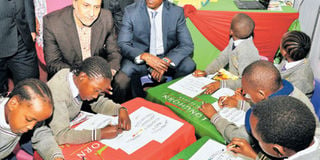September brings you Nairobi Book Fair, Macondo Literary Festival

Centum Group CEO James Mworia and the Iranian ambassador to Kenya, Dr Hadi Farajvand, join Makini Academy pupils in a colouring activity during the 2017 Nairobi International Book Fair at Sarit Centre, Nairobi. PHOTO| FILE | NATION MEDIA GROUP
What you need to know:
- KPA says NIBF will “have 66 local exhibitors and 15 international exhibitors from China, Egypt, Uganda, Korea, Senegal, Iran, Tanzania, South Africa, India, Pakistan, US and Nigeria.
Macondo begins with workshops focusing on history and literature, before the opening ceremony at 4.30pm on Friday, September 27.
The Nairobi International Book Fair (NIBF), the Kenya Publishers Association’s end-of-the-year festival, is here once more. It will run from September 25 to 29 at Sarit Centre, Westlands, Nairobi. This annual books and literary festival is in its 22nd year. It is probably the most significant event in Kenya’s annual art and culture calendar.
29,000 VISITORS
In the five days of the festival, there will be prize-giving ceremonies involving schools and learners, writers’ workshops, training for teachers, literary conferences and book signings by authors, all culminating in the Text Book Centre-Jomo Kenyatta Prize for Literature awards to winning authors and publishing houses for the year 2018/2019.
KPA says this year they will “have 66 local exhibitors and 15 international exhibitors from China, Egypt, Uganda, Korea, Senegal, Iran, Tanzania, South Africa, India, Pakistan, US and Nigeria. Exhibitors range from publishers associations, digital publishers, book publishers, self-publishers, authors, printers, embassies, NGOs and government departments.”
Considering that KPA reports that they had more than 29,000 direct visitors to the festival in the five days, one would imagine that the national and county governments would want to get involved. Thousands of schoolchildren visit the fair to meet authors, attend workshops and exhibitions and buy books. The ministries in charge of education, culture and national integration should be key partners of this festival.
TRANSNATIONAL
Yet every year one does not see and feel the presence of the government. This year, KPA will host Egypt’s Minister for culture Dr Ines Abdel-Dayem, from 9am to 1pm on September 26, as the chief guest. Anyone familiar with the history of Egypt knows the premium that ancient and contemporary Egypt put on literacy and education. Egypt is a major centre of learning in North Africa and the Middle East, and the country gives scholarships to Kenyan students to study in its universities.
What adds more flavour to this year’s book fair is that it will also host the African Writers Conference (AWC) between September 27 and 29. The conference is a collaboration between the African Writers Development Trust and the Writers Guild Kenya. The AWC will involve a series of events, which will end in the “unveiling of the 2019 African Writers Awards”. The awards will be in four categories: African Writer of the Year for Short Stories; African Writer of the Year for Poetry; African Writer of the Year for Flash Fiction and African Writer of the Year for Children’s Literature. The conference seeks to invoke the spirit of a transnational African literary connection that was so common in the 1960s to the 1970s.
LANGUAGE
The movement of writers and academics then ensured that even though travel was not as fast as it is today, books crossed borders, ideas travelled, too, and were shared in new places and often writers settled in another country for a time. Thus, Kenya once hosted the likes of Ezekiel Mphahlele, John Ruganda, Robert Serumaga, Okot p’Bitek, Taban Lo Liyong, David Rubadiri, Joe de Graft and Austin Bukenya. This spirit has been on the wane from the 1990s to date. Notwithstanding the internet and ease of travel, African writers are often read quite selectively, partly due to language barriers.
This is the reason behind the Macondo Literary Festival, initiated by Yvonne Adhiambo Owuor and Anja Bengelstorff. The festival, which will take place at the Kenya Cultural Centre from September 27 to 29, will bring together Portuguese and English-speaking authors from nine different countries and Brazil, according to the organisers.
The theme for the festival is “Re-imagining African Histories through Literature”.
Macondo begins with workshops focusing on history and literature, before the opening ceremony at 4.30pm on Friday, September 27. There will be a series of workshops, book launches, talks and encounters, involving authors, guest speakers and audiences on a range of topics, including the relationship between history and fiction, how literature deals with violence, women and writing, translation and literature, on Saturday and Sunday.
BOUNDARIES
The significance of the Macondo Literary Festival is in its desire to provoke not just conversations between lusophone and anglophone authors but also stage encounters between authors and audiences, and hopefully redefine the supposed cartographical boundaries that divide Africans. Considering that the ‘border’, even if it were marked by a wall, really only exists in the mind, the question that the Macondo literary festival appears to pose is: Shouldn’t literature be the one obvious means to break down that real or imaginary wall?
All the goodness of the NIBF (and the other literary festivals) aside, one always feels that Kenyans have not invested enough in it. Our universities hardly get involved in the fair (except when selling books); our publishing companies tend to exhibit their books as a ‘given’ and do little else; our media pays the NBIF little attention; the government’s main participation seems to be simply in officiating at ceremonies. Yet there is always something for everyone who cares about books.
The writer teaches literature at the University of Nairobi. [email protected]





